What is sales prospecting? TLDR — It's the process of searching for and qualifying potential customers who have an immediate or future interest in your solution, moving them through the sales funnel until they convert.
What's the difference between leads and prospects? TLDR — Leads have shown interest (like visiting your website), while prospects are qualified leads whose needs and interests align with your solution — they're more likely to buy.
Which tools should I use for sales prospecting? TLDR — Sales Hub automatically populates business insights from 20M+ companies using just an email address, while tools like Hunter, Kixie, and UserGems help with email finding and outreach automation.
Bonus: Sales Hub integrates seamlessly with HubSpot Smart CRM to provide unified customer data management.
How do I craft the perfect prospecting outreach? TLDR — Personalize every message, reference specific pain points, and use the BASHO sequence (alternating emails/voicemails over 2 weeks) to maximize response rates.
Sales prospecting is a critical pillar of any effective sales process. It’s not just a nice-to-have — prospecting in sales ensures that the leads you’re communicating with have an immediate (or potential) interest in a solution like yours.
But, through my career in sales and marketing, I’ve learned firsthand that tracking down and qualifying viable sales opportunities can be as frustrating as it is essential. That’s why I’ve put together this guide to sales prospecting techniques.
Below, I’ve put together everything you need to know to navigate the prospecting process like a pro.
Table of Contents
- Sales Prospecting Tools
- What is prospecting?
- Why is sales prospecting important?
- How to Prospect Effectively
- Sales Prospecting Skills
- Sales Prospecting Tips
- Sales Prospecting Process
- Outbound vs. Inbound Prospecting
- Sales Prospecting Questions
- Prospecting Email Examples
- Prospect Marketing
What is prospecting?
Prospecting is the process of initiating and developing new business by searching for potential customers, clients, or buyers for your products or services. The goal is to move these prospects through the flywheel until they convert to revenue-generating customers.

Free Sales Prospecting Guide
An easy-to-use guide full of templates, best practices, and strategies for salespeople and managers looking to close deals.
- Data-backed behaviors top sellers use to combat pushback
- How to write effective meeting invitations
- A three-step objection handling framework
- And More!
Download Free
All fields are required.

Why is sales prospecting important?
Prospecting helps you connect and work with potential customers whose needs and interests align with your solution. It gives you perspective on your prospects’ pain points, ensuring that you’re getting in touch with contacts who will be receptive to your value proposition.
It’s extremely effective, too. Recent research shows that more than 7 out of 10 buyers want to hear from salespeople early on in the buying process, and 82% of buyers accept meetings when a salesperson reaches out first. Moreover, top-performing salespeople who engage in sales prospecting generate nearly three times more sales meetings than those who don’t prospect.
When you prospect successfully, you can schedule meetings with better-fit leads: that is, people who have a legitimate need for or interest in your offering. I’ve found that these good-fit customers aren’t just more likely to buy — they generally provide more long-term business too. These leads become particularly valuable customers, as they’re much less likely than their worse-fit counterparts to churn shortly after closing a deal.
But how can you identify good-fit customers? Well, that typically starts by asking the right questions. For more insight on that process, check out this article.
https://www.youtube.com/watch?v=tKqK8gsM-1E
Prospects are also often conflated with another type of contact: leads. As a salesperson, you need to be able to distinguish between the two. You and your team will be connecting with both when prospecting, and each one requires a distinct approach.
Though they might seem similar — for one, they both exist around the top of the sales funnel — there are some important distinctions between prospects and leads. Let's take a look at how they differ.
Lead vs. Prospect
Leads are potential customers who’ve expressed interest in your company through behaviors like visiting a website, subscribing to a blog, or signing up for a free trial. In contrast, prospects are leads who have been researched further and qualified. This means they have qualities, potential needs, and interests that align with the solution you offer.
For instance, let’s say your business sells project management software for growing construction firms. If the owner of a mom-and-pop construction operation that recently scored a big contract with a fast food chain subscribes to your blog, you’d probably treat them as a prospect — not just a lead.
Depending on their qualifications and fit, a prospect (not a lead) can be classified as a potential customer, even if they have had limited or no interaction with your company. In contrast, if someone outside of your target market signs up for a free trial, you might consider them a lead, but they’d hardly qualify as a prospect.
That said, despite their differences, the endgame when interacting with prospects and leads is the same: to nurture them until they buy your product or service. That process begins the moment you start prospecting, and it doesn’t end until you close a deal.
But how do you even begin prospecting? Below, I’ve put together a simple guide for getting started. Then, I’ll cover some proven tips for finding good-fit prospects who will be more likely to close.
How to Prospect Effectively
- Research your prospect and their business to gauge whether you can provide value.
- Prioritize your prospects based on their likelihood of becoming customers.
- Prepare a personalized pitch for each prospect.
- Craft the perfect first touch — and ensure you're helping, not selling.
- Iterate on your prospecting process to understand what you can improve.
Unproductive prospecting can be a huge waste of time, and certain approaches have proven to be more effective than others. To get the most out of your efforts, I’d suggest leveraging the inbound framework — a method that you can apply to virtually any sales process.
That said, the most productive prospecting method for you is exactly that: the one for you. The prospecting frameworks, tactics, and concepts that best align with your skill set and offering won’t be exactly the same as those of all of your peers.
That’s why I’ve also weaved in personal prospecting tips and tricks from the best salespeople I know. Pick and choose what works best for you — and if you’re not sure, don’t be afraid to experiment!
1. Research your prospect and their business to gauge whether you can provide value.
You’re going to hear this again and again throughout this post, but you can't prospect effectively if you don’t qualify your prospects. Qualification is by far the most important aspect of prospecting. After all, you can’t provide value to someone if you have no idea what’s valuable to them in the first place.
You should look to accomplish a few goals in this stage of prospecting:
- Determine whether the prospect is workable.
- Qualify and begin prioritizing prospects.
- Find opportunities to develop a connection through personalization, rapport building, and trust development.

Free Sales Prospecting Guide
An easy-to-use guide full of templates, best practices, and strategies for salespeople and managers looking to close deals.
- Data-backed behaviors top sellers use to combat pushback
- How to write effective meeting invitations
- A three-step objection handling framework
- And More!
Download Free
All fields are required.

2. Prioritize your prospects based on their likelihood of becoming customers.
It might go without saying, but some prospects are more likely to close than others. So, if you want to save yourself time and maximize your deal potential, you need to know where to dedicate most of your time and effort — and that starts with prioritizing the right prospects.
How you prioritize your prospects will likely be specific to factors like your role, your vertical, and your sales org’s preferences. But regardless of those elements, the fundamental concept always boils down to one common process: creating a few buckets of prospects and then focusing on one at a time.
Scoring Potential Prospects
Prospects are usually qualified according to certain dimensions, meaning that certain characteristics, including factors such as deal size or timing, are deemed more important than others when identifying viable prospects. Those elements hold more weight when qualifying.
For example, say your sales org prioritizes the size of a deal above all else. In that case, deal size might account for 70% of what makes an ideal prospect. If timing is considered a relevant — but less crucial — factor, it might account for just 10% of what makes an ideal prospect.
Once you’ve assigned a percentage to each quality, you can assign a score to each dimension for each potential prospect. In other words, you would assign a value between zero and 100 to each dimension based on how well a lead fits your ideal picture of that quality.
So if a lead’s potential deal size was perfect, you would assign them a score of 100 for that quality, and if it was an absolutely awful fit, you would assign them a score of zero.
Next, multiply the score you gave each lead for each quality by the weight percentage you’ve assigned to that characteristic. So if a lead’s potential deal size was 50 out of 100, and you’ve assigned that quality a percentage of 70%, that would add 35 to the potential prospect’s score.
Finally, add up the products of each quality’s score and percentage to determine the prospect’s total score. From there, you can put together a list, ranking each potential prospect by their viability and allowing you to prioritize your prospecting efforts.
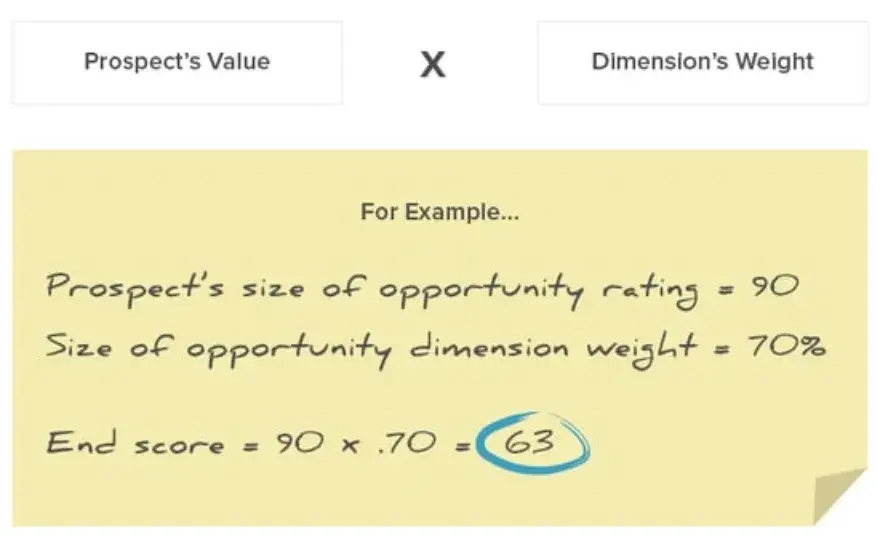
Obviously, that’s a lot to keep track of on your own. Thankfully, there are plenty of lead management resources that can do this automatically.
3. Prepare a personalized pitch for each prospect.
Every prospect is unique — with their own unique backgrounds, interests, needs, and preferences — and absolutely none of them want to be treated like just another name on a list.
That’s why you need to gather in-depth information on your prospects that will help you put together effective, personalized pitches and conduct thoughtfully targeted outreach.
Of course, you can’t do that without understanding what your prospects care about. There are a few ways I’ve found that can help you figure that out. That includes:
- Taking a look at the prospect’s blog to learn what they care about through the articles they’re writing and publishing.
- Identifying and reviewing their social media profiles. Do they have recent updates or new posts?
- Reviewing the “About Us” page on their company website.
Obviously, that list isn’t exhaustive. There are lots of other ways you can get a pulse on key elements to shape your efforts, including exploring your prospect’s interests, what their business does, how it’s performing, the state of its industry, where it stands in its competitive landscape, and common pain points similar companies face.
Once you’ve learned more about your prospect’s business and role, you need to find a reason to connect. Do you have mutual connections? Has there been a trigger event? Have they recently visited your website? If so, which search terms drove them to your site? Which pages did they look at?
If you want to get more high-level with your prep, you can create a decision map to outline the prospect’s options and end goals. That can help you better handle any objections and personalize a pitch that aligns with their primary objectives.
4. Craft the perfect first touch — and ensure you’re helping, not selling.
As I just touched on, personalization is key to crafting an effective pitch — but its utility isn’t limited to what you say. If you want to prospect effectively, you need to personalize how you start your conversations.
Regardless of whether you call or email, your outreach needs to be tailored to suit your prospect’s business, goals, needs, industry, and personal preferences. To do so, keep the following tips in mind when contacting a prospect:
- Personalize. Reference a specific problem that the prospect is encountering and offer a specific solution targeting that problem.
- Stay relevant and timely. Ensure that the issue the prospect is trying to solve is still relevant to them and their team.
- Be human. No one likes to communicate with a robot. Adding in details like wishing someone a happy holiday or conveying how awesome you think their company’s product is are real touches that allow us to establish a connection on a deeper level.
- Help, don’t sell. Provide value and ask for nothing in return. This process isn’t about us. It’s about them. For example, instead of scheduling a follow-up meeting, you could offer to conduct an audit of their digital media presence and get back to them with your findings in a week.
- Keep it casual. Remember that this is just a conversation. Stay natural, and avoid sounding sales-y as much as possible. The key to prospecting is that we’re never selling. We’re simply determining if both parties could mutually benefit from a relationship.
5. Iterate on your prospecting process to understand what you can improve.
Effective prospecting isn’t stagnant. You need to constantly track, learn from, and ultimately improve upon your process, constantly refining your approach and finding a groove that will consistently deliver results.
Every time you engage in prospecting, keep notes throughout the process. Assess which activities generated the most value and which wasted time. Specifically, after each contact with a prospect, assess how well you:
- Uncovered challenges.
- Helped create well-defined goals.
- Confirmed availability of budget.
- Understood the decision-making process.
- Determined consequences of inaction.
- Identified potential results of success.
This self-reflection will help you improve your sales prospecting techniques in the future.
Now, let’s look at some of the key skills you need to develop if you want to be an effective prospector.

HubSpot's 2025 Sales Trends Report
This in-depth report includes sections, covering:
- How buyers are becoming more self-informed
- How sales teams are using AI and automation
- Adapting to tighter budgets
- And more!
Download Free
All fields are required.

Sales Prospecting Skills
1. The Ability to Identify Target Accounts
Daryll Dorman, Sales Manager at AllMax Software, says, "To be effective prospectors, sales reps need to understand what their target account looks like. You can analyze your current customer base to figure out the best size using filters from HubSpot.
“From there, you should use tools like LinkedIn to gather the different stakeholders you'll need to work with. Tailor your conversation to the role you are targeting and be consistent. You will achieve success before you know it!”
2. Effective Listening Skills
Kristy Galea, Director Of Sales at Cadence SEO, says, "One skill sales reps need to develop is effective listening — I see so many reps prepare decks to pitch, but if they are not listening to the pain points of the prospect first, then the fully-prepared deck has zero value.
“Effective listening, understanding, and building value around what the buyer is communicating is essential in building the relationship and winning the business in a positive way.”
3. Product Knowledge
Mike Sadowski, Founder & CEO of Brand24, says, “For me, the most important one is product knowledge. You've got to know your stuff inside and out. It's not just rattling off features, but understanding how you solve real problems for customers. When you reach out, you need to quickly explain how you'll add value to their business.”
4. Time Management
Sadowski also says, “Time management is also key. Prospecting is a numbers game, and you've got to juggle multiple leads at different stages. It's about finding that balance between quantity and quality. You can't spend all day on one lead, but you also can't just blast generic messages to thousands.”
5. Integrity
Dennis Sanders, Founder of Burning Daily, says, "I still believe that integrity, as a virtue, is your most potent weapon. It is a bedrock upon which lasting client relationships are built and the cornerstone of sustainable success for you in your sales career.
"Any amateur sales rep can chase quick wins through half-truths and exaggerations, but those who are honest about their product or services can create long-term partnerships of trust with their prospects.
“One should view honesty not as a constraint but as a liberating force. When you're transparent, you're not just selling a product; you're selling trust. And trust in business is the most valuable currency. Your word is your bond. Break it, and you're not just losing a deal — you're poisoning the well of future opportunities.”
6. Empathy
Raviraj Hegde, SVP of Growth & Sales at Donorbox, says, “Empathy is critical. Understanding a prospect's pain points and seeing the world through their eyes helps build trust. When I coach sales teams, I emphasize the importance of active listening. By truly hearing what the prospect is saying — and sometimes what they’re not saying — a rep can tailor their approach, making the conversation feel more like a collaboration than a pitch.”
7. Perseverance
Michael Nemeroff, CEO & Co-Founder of Rush Order Tees, says, "Unyielding perseverance is a must. If they haven’t asked you to stop calling yet, you haven’t called them enough. Prospecting is by far the hardest part of the job because you hear ‘no’ all day long. You can’t let those responses slow you or emotionally deplete you.
“The very best in the business have a solid routine to help them control the negative influences in their lives. They might read, listen to podcasts, or find other ways to manage their stress and recharge their batteries so they can come back fresh each time after rejection.”
8. Learning From Feedback
Cesar Cobo, Director of Operations at Webris, says, "Successful sales reps excel at learning from feedback. Actively seeking out feedback from different sources, such as prospects, peers, or managers, can be a game-changer.
"Imagine a scenario where a sales rep receives constructive criticism from a prospect about their pitch. Instead of taking it personally, they use that feedback to tweak their approach, making future pitches more compelling and tailored.
"This openness to external insights allows them to refine their methods continuously, leading to improved engagement and conversion rates. Feedback isn‘t just about identifying mistakes — it’s also about recognizing strengths. When managers or colleagues provide positive feedback, it reinforces what’s working well, enabling reps to double down on those strategies.
“For example, if a manager praises a sales rep for their excellent follow-up technique, the rep can make that a standard part of their approach. The constant loop of learning and adjusting makes a well-rounded, effective prospector who can navigate diverse sales scenarios with agility and confidence.”
Sales Prospecting Tips
- Look at your prospects’ career pages.
- Use the GPCTBA/CI sales qualification framework.
- Classify prospects with ratings.
- Subscribe to your prospects’ blogs.
- Keep track of your prospects on X (formerly Twitter).
- Batch prospecting sessions.
- Use a healthy mix of email and phone communication.
- Use the BASHO sequence for emails and calls.
- Follow-up after a closed-lost deal.
- Thoroughly understand your vertical.
- Ask for referrals.
1. Look at your prospects’ career pages.
Understanding a company’s priorities and direction can inform smarter, more targeted prospecting. If you have a pulse on where a business is investing or growing, you can get a better sense of its specific interests and challenges — helping you shape more thoughtful, specific value propositions. But where can you readily access that kind of information?
Well, a company’s careers page is a good place to start. For example, let’s say you sell a suite of marketing solutions that includes a content management system. If you see that a company has job listings for multiple content marketing roles, you can tailor your pitch to highlight the benefits of your CMS.
Alternatively, if your prospect works for a public company, you can also look at its annual financial report (Form 10-K). This form includes a section called “Risk Factors,” which you can use to see whether there’s alignment between the company’s stated business challenges and your product offering.
.png)
Free Guide: 101 Sales Qualification Questions
101 Questions to Ask Contacts When Qualifying, Closing, Negotiating, and Upselling.
- Budget Questions
- Business Impact Questions
- Competitor Questions
- And More!
Download Free
All fields are required.
.png)
2. Use the GPCTBA/C&I sales qualification framework.
There are countless sales qualification frameworks, but the HubSpot team uses one called the GPCTBA/C&I framework (and they promise that it sounds more confusing than it is). This framework includes the following components:
- GPCT (Goals, Plans, Challenges, Timeline).
- BA (Budget and Authority).
- C&I (Negative Consequences and Positive Implications).
Here is a breakdown of sample questions to ask potential customers for each part of the framework:
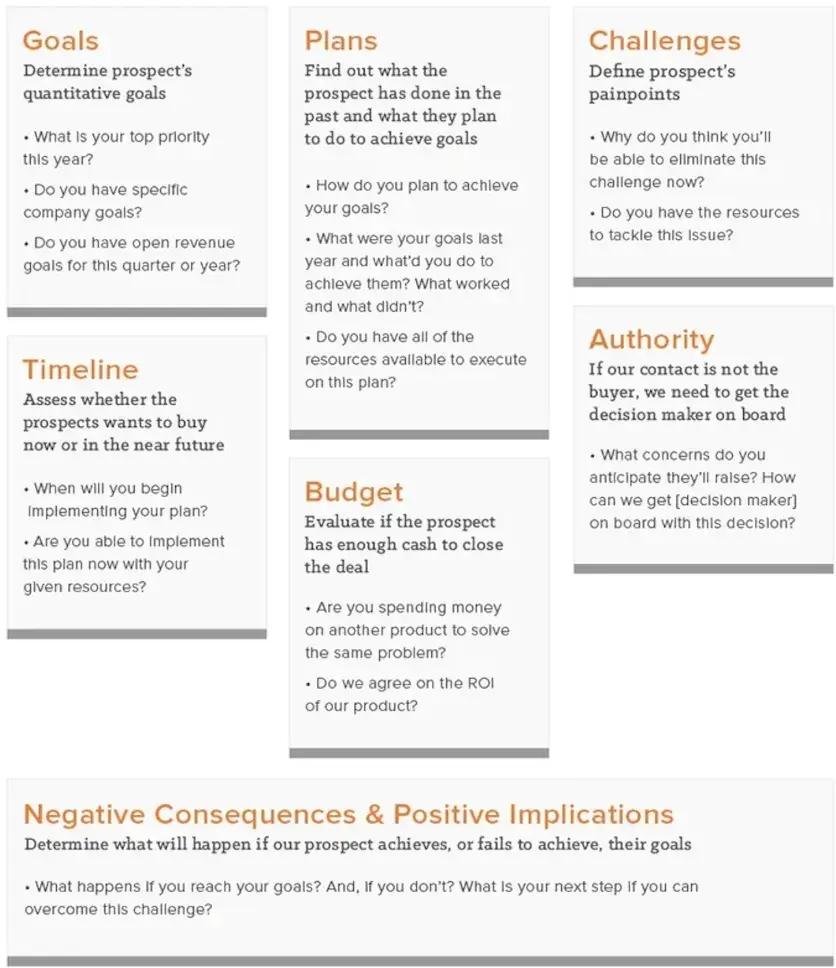
Armed with this comprehensive framework, you can focus on creating a highly targeted, relevant list of questions, helping to ensure that every prospect you talk to meets the criteria of your fine-tuned customer profile.
3. Classify prospects with ratings.
Another strategy that I’ve found can be particularly effective is to classify prospects qualitatively with respect to their suitability. You can rate them as high, medium, and low, like so:
High
- Matches all criteria of your customer persona
- Has a clear business challenge that aligns with your product offering
- Has a high level of interaction with your website or social media accounts
- You are able to connect with a decision-maker
- You have a mutual connection or common interest (i.e., a mutual friend on LinkedIn, or you graduated from the same college)
Recommended effort: Five touchpoints every other business day
Medium
- Matches some elements of your customer persona
- Has a clear business challenge that aligns with your product offering
- Has some level of interaction with your website or social media accounts
- You are able to connect with an influencer within the organization
Recommended effort: Four touchpoints every other business day
Low
- Doesn’t match your customer persona
- Unclear business challenge
- Has had limited or no interaction with your website or social media accounts
- You are unable to connect with an influencer or decision-maker
Recommended effort: Three touchpoints every other business day
4. Subscribe to your prospects’ blogs.
Your prospects’ blogs can be a great source of intel into their needs and interests. Of course, reading countless articles can be highly time-consuming — but it’s possible to skim through the latest updates and still glean useful insights. Here’s my approach:
- I start by opening each interesting post in a new tab.
- Then, I quickly skim each post.
- After skimming through all of the posts, I narrow it down to the most interesting 20-30 posts and read these more fully. Importantly, it’s not just about what I personally find interesting: I always try to put myself in my prospect’s shoes as I’m reviewing these articles, searching for pain points or trig
- Finally, I use the most interesting, relevant information I find in the articles to tailor an email or a call to a prospect, helping me craft more context around the prospect’s situation and maximize the impact of that initial contact.
5. Keep track of your prospects on X (formerly Twitter).
Nowadays, everyone’s on X (formerly Twitter) — including your prospects. Creating a list of top-priority prospects on Twitter can be a great way to track trigger events and streamline the research process. Here’s how to set it up on X’s mobile app:
- Click your profile picture in the upper left-hand corner, and then click “Lists.”
- Now, click the blue button with a list icon and a plus sign in the bottom right-hand corner.
- Name the list and then set it to “Private” so only you can access it.
- Finally, add the prospects you want to track to your list. Just search for their accounts and click the button that says “Add.”
Note: You may want to make separate lists for your high-priority prospects, medium-priority prospects, and low-priority prospects.
Now that you’ve created your first list, you can easily monitor your prospects’ activity using a tool like HubSpot Social Inbox. HubSpot’s Social Inbox color codes your customers and leads and helps you prioritize your engagement. You can see what type of content resonates with your prospects by tracking their interactions, conversations, and new follows.
Once you’re set up, just watch as this feed populates with prospect activity. You can check your feed every morning and afternoon to see if any trigger events have occurred that could offer a valuable opportunity for you to connect.
6. Batch prospecting sessions.
Another one of my favorite approaches is to batch my prospecting sessions. Batch sessions for two to three hours at a time, and take a quick five-minute break between each hour.
Use your phone or an egg timer to set a countdown for 20 minutes, 30 minutes, or 45 minutes, depending on how much time you scheduled for the call.
Make sure to end the call when the timer goes off, and then use five minutes for following up, five minutes for updating notes and administrative tasks in your CRM, and a final five minutes to prep for your next call.
7. Use a healthy mix of email and phone communication.
When it comes to establishing contact, there’s no one-size-fits-all solution. Two of the most common modes of communication are email and phone — and while they both have pros and cons, the most effective approach is generally a healthy mix of the two.
Indeed, I’ve found that some salespeople tend to prefer cold emailing, while others will dive into cold calls. It’s important to go with what you feel most comfortable with, while also recognizing the value of mediums that may come less naturally to you.
First, let’s take a look at the pros and cons of email communication:
|
Email Pros |
Email Cons |
|
Emails are visual, and they allow prospects to consider the offer on their own time. |
Email is a cluttered space, so it may be harder to grab a prospect’s attention. |
|
Emails provide prospects with adequate time to research your company and product. |
Emails are easily deleted or forgotten. |
|
Emails can easily be forwarded to key stakeholders who might be a better fit for you to speak with. |
You may have to follow up multiple times before you get a response. |
Now, let’s look at the pros and cons of phone communication:
|
Phone Pros |
Phone Cons |
|
Phone calls are less common than email, so they are more likely to grab a prospect’s attention. |
Some prospects may feel overwhelmed by a call and thus be less inclined to consider a pitch or schedule a second meeting. |
|
Calls immediately establish a more intimate connection and offer salespeople the chance to develop rapport. |
While intimate, calls can be seen as intrusive, especially when unscheduled. |
|
Calls are often more timely than email communication, and they can reduce the time it takes to close a deal. |
There’s no guarantee a prospect will pick up the phone, and voicemail can often be as cluttered as email, depending on volume. |
Successful first-touch strategies often incorporate both email and phone to take advantage of the pros of both while minimizing the cons.
8. Use the BASHO sequence for emails and calls.
Sales leader Jeff Hoffman pioneered an approach known as the BASHO sequence, which advocates for the following combination of voicemails or emails to build connections with prospects:
- Voicemail / Email: Wait for 24 hours.
- Voicemail / Email: Wait for 48 hours.
- Voicemail / Email: Wait for 72 hours.
- Voicemail / Email: Wait for five days.
- Breakup Voicemail / Email.
Alternate between voicemail and email, with unique messaging each time. This technique allows prospects to consider your offer, conduct their own research, and respond at a time that is convenient for them.
But, how do you leave a voicemail or send an email that prospects will actually want to respond to? Let’s dive into the do’s and don’ts of each communication method below.
Tips for writing a warm email
If you’re looking to send a first-touch email that gets opened, here are some essentials to include:
- Engaging subject line. The subject line has to pique the prospect’s interest while avoiding cliché hooks.
- Personalized opening line. You should begin your cold email by saying something about the prospect, not about your business. After all, this process is about finding the prospect’s pain points and determining a way to add value to their business.
- Clear connection. Now, you have to make a connection. In your opening, the prospect learned why you’re reaching out to them, but now they need to know why they should care about what you do.
- Concrete call-to-action. Suggest a concrete time to connect or ask a specific question to make it clear that the ball is in their court. Some of my favorite lines are: “Do you have ten minutes to catch up tomorrow?” or “Are you available for a 30-minute call on Tuesday between 9 and 11 a.m.?”
You can also try sending a calendar invite instead of an email to get straight to the point. In the description section, you can type up a personalized message like this:
Author of the award-winning sales book Snap SellingJill Konrath suggests another helpful approach: You can schedule a short, five-minute meeting to get your foot in the door with prospects whose calendars are particularly swamped.
Tips for a Prospecting Call
If you decide to call a prospect, I’d suggest following this basic structure for the call:
- Establish rapport. Don’t shy away from personal conversations, like asking how a prospect’s weekend was or what team they’re rooting for in the game tonight. These intimate touches can help you develop more meaningful relationships with prospects and enhance your likeability, in turn (hopefully) making them more likely to buy from you.
- Leverage pain points. Dive into their pain points during the call. By the end of the conversation, you should know all of their primary business challenges and the underlying causes associated with them. Once you have an understanding of these key issues, you can better position your product or services to address those pain points.
- Create curiosity. Ask more than you tell. This conversation is about them, about understanding their needs and problems. The less you talk about your business and product, and the more you ask questions about them and their business, the more your prospect will be interested in hearing the final pitch.
- Wrap it up. Find a time 24-48 hours after the discovery call to book a follow-up meeting. Try this line: “Would you have 30 minutes to follow up this week? My colleague, John, will join us — he’s an expert in X, Y, Z. My calendar’s open; what time works best for you?”
9. Follow-up after a closed-lost deal.
Rejection is never fun, but it can be useful. Bryan Kreuzberger, founder of the lead generation company Breakthrough Email, sends a follow-up email if prospects respond with a rejection. The purpose of this email is simple: Learning. You can use a rejection as an opportunity to better understand how you can improve your sales techniques by following this template:
Hi [prospect name],
Thanks for your email. I just closed your file. I have a quick question as a final follow-up. Why aren’t you interested? Was it something I did?
If there is any way I can improve, let me know. I’m always looking for input.
Thanks for your help,
[Name]
I’ve found that sending a simple email like this can make a big difference, helping sales teams identify flaws in their processes while also maintaining a positive relationship with the prospect.
10. Thoroughly understand your vertical.
Sales prospecting is about identification and consultation. In other words, you need to be able to identify prospects who will be receptive to your efforts and frame yourself as a consultative resource to build trust instantly in your initial conversations.
Your ability to deliver on both of those elements starts with developing a thorough understanding of the space in which you operate. You need to know your vertical inside and out — the nature of the industries you serve, how these companies generally operate, relevant technical jargon and concepts, and the most common issues that your prospects run into.
That starts with research. Once you start operating within an industry or serving businesses of a particular scale, get a pulse on the more technical aspects of the space. As best you can, learn how the products or services that the businesses you connect with work.
It’s also important to learn industry-specific terminology that you can reference when talking with prospects. That will help establish you as an authority in your prospects’ space (instead of sounding like just some random salesperson).
Additionally, get a feel for how your vertical has evolved by brushing up on its history — and stay abreast of industry trends by subscribing to company blogs, industry-specific publications, or any other resources that can give you perspective on where the space stands and where it might be headed.
Doing the work to thoroughly understand your vertical will help you both connect with the right people and know what to say to resonate with them once you’ve got them on the phone.
11. Ask for referrals.
According to HubSpot’s recent survey of over 1,000 sales professionals, 66% of salespeople say referrals from existing customers offer the best leads — and high-quality leads often become productive prospects.
By asking for referrals, you can generate a wider base of warmer, more easily convertible contacts, giving yourself a crucial leg up when prospecting. When an existing customer connects you with a referral, they’re essentially saying, “I think this person could stand to gain from your solution.”
In turn, you can go into engagements with these leads, knowing they’re more likely than most cold contacts to consider your offering. You can also reference the customer who put you in touch with that lead when conducting your outreach — a solid conversation starter that helps you develop instant rapport.
So, how do you ask for referrals? Well, obvious as this might sound, you just ask for them. After you convert a prospect into a customer, follow up with them and ask if they know anyone else who might benefit from your solution.
If they don’t know anyone straight off the bat, or if they are reluctant to hand out names right away, wait until they’ve enjoyed your product or service for a while. Then, when you know they’re happy with your offering, check in again.
Now that they’ve been a customer for some time, they might be more likely to put you in touch with some contacts who will be willing to hear you out. To sweeten the deal even more, you can also offer them some sort of incentive, like a discount or other promotions, in exchange for a referral.
With all of the steps and strategies involved in the prospecting process, you might find yourself spending a lot of time on menial tasks. Luckily, there are a number of sales prospecting templates and tools you can use to boost productivity and automate tasks.
Sales Prospecting Tools Comparison
|
Sales Prospecting Tool |
HubSpot CRM |
HubSpot Sales Lead Management & Prospecting Software |
Hunter |
Kixie |
|
Key Features |
Auto-populates business insights from 20M+ business database, centralized prospect tracking, customizable dashboard without IT help |
Conversation intelligence, automated email sequences, customizable templates, predictive lead scoring, seamless integrations |
Find email addresses by role, identify emails via common formats, bulk or individual email generation, verifiable prospect connections |
Customizable calling and texting platform, extensive integrations, contact thousands of prospects daily, minimal training required |
|
Pricing |
Free plans available |
Free plans available |
Free plans available |
Plans start at $35 per month |
|
Free Trial |
Yes |
Yes |
Yes |
Yes |
Sales Prospecting Tools
You can select specific tools from this list to use independently, or you can use multiple in tandem. To determine your needs and gaps, consider which tools you currently use for prospecting. Then, experiment with the options below to discover which ones work best for your business.
1. HubSpot CRM
Pricing: Free plans are available
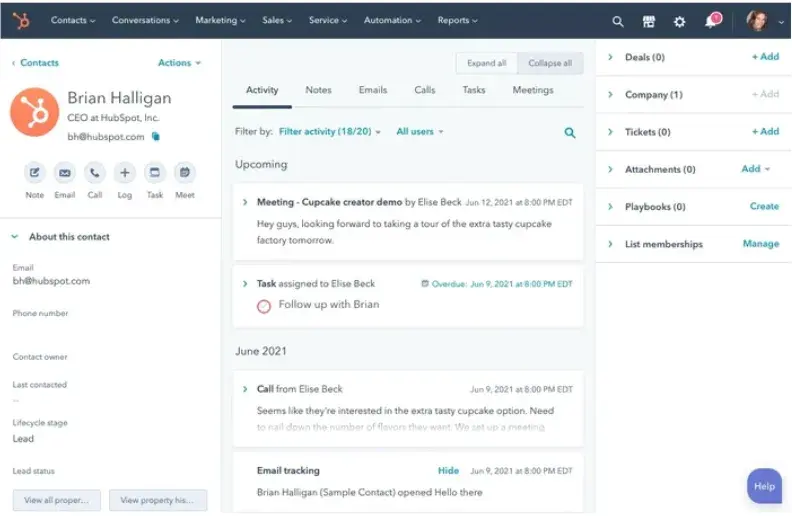
Best for: Accruing and applying data for detailed company insights
The HubSpot CRM has a robust suite of features that can cover a range of your business’s needs — but when it comes to prospecting, HubSpot sets itself apart with its support of detailed company insights.
Your prospecting efforts won’t take you too far if they’re poorly informed, but sorting and applying relevant prospect information can be as frustrating as it is essential.
The HubSpot CRM automatically populates new contact, company, and deal records with details from its database of over 20 million businesses. All you need is a prospect’s corporate email address.
This CRM is made even more beneficial thanks to Breeze AI automation. It's Breeze Prospecting Agent automates sales prospecting and research to help teams focus on high-value activities.
So, if you’re in the market for a solution that can streamline, simplify, and enhance your prospecting efforts by giving you a fleshed-out picture of who you’re selling to, the HubSpot CRM might be the way to go.
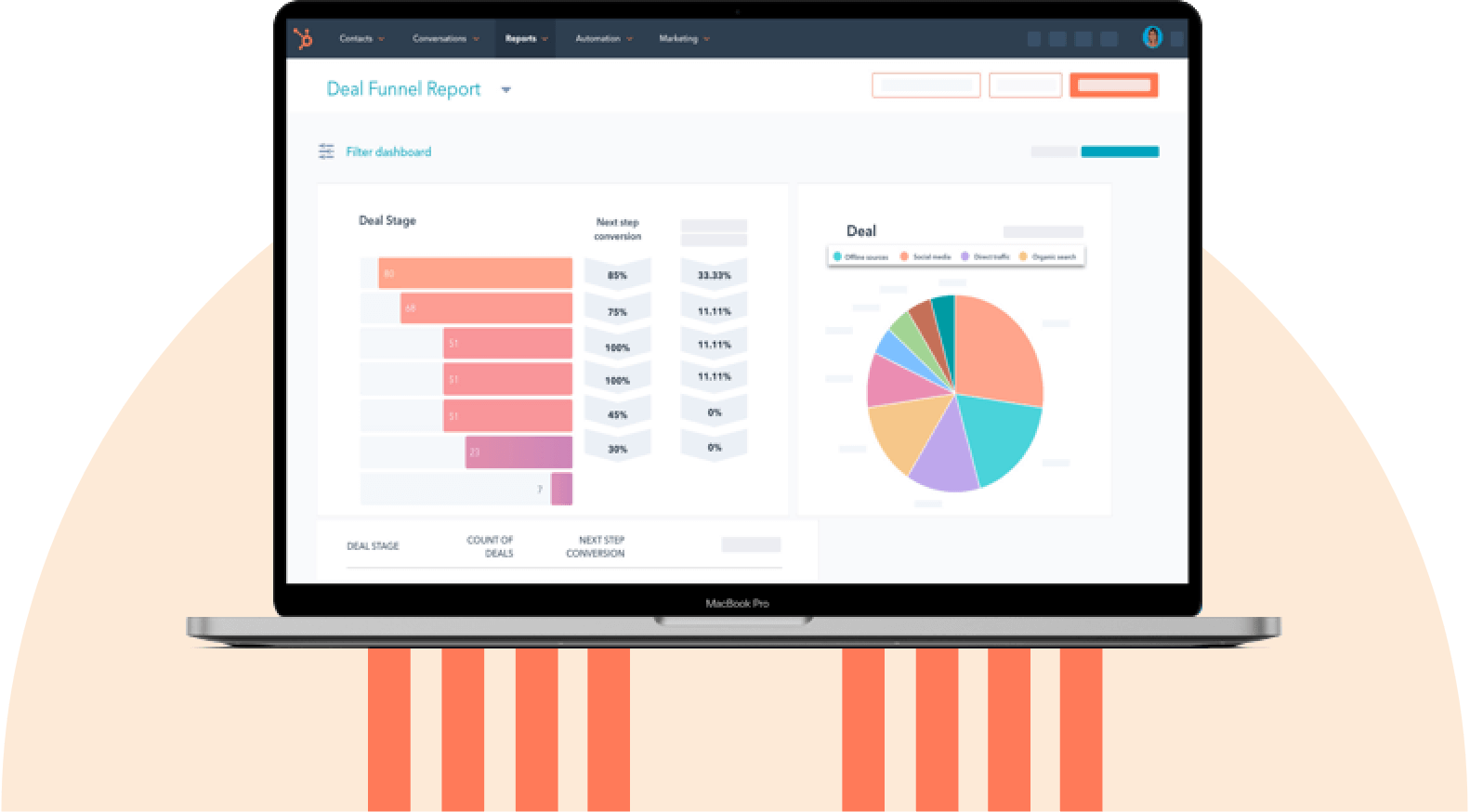
HubSpot's Free CRM Software
Free CRM Software & Tools for Your Whole Team
- Sales
- Marketing
- Operations
- Customer Service
Key Features and Benefits
- Automatically populates business insights based on a database of over 20 million businesses
- Offers a centralized location for easily sorting and tracking prospect details, including intel from sales calls, emails, notes, deal activity, lifecycle changes, and social media
- Includes an accessible dashboard that lets you choose which information to display on your contact, company, and deal records (without any help from IT)
2. Hunter
Pricing: Free plans are available
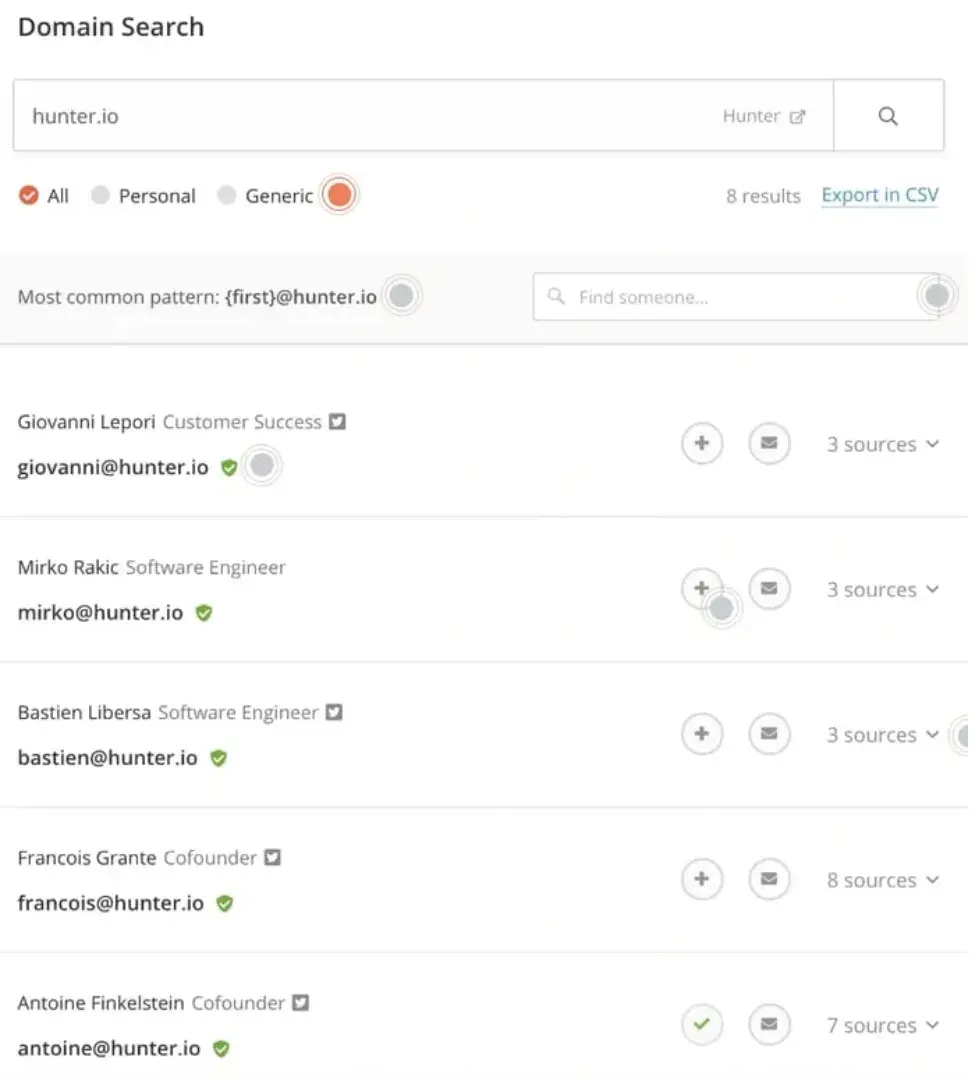
Best for: Aggregating email data for prospecting
Hunter offers a unique resource to set email prospecting efforts in motion. Its solution allows users to quickly and easily translate web data into a list of email contacts, giving salespeople easy access to a solid base of targeted prospects.
Hunter boasts an impressive roster of customers — including Google, IBM, and Microsoft — and for good reason: It’s a solution that combines accessibility with powerful functionality. Virtually any salesperson can easily leverage it to verifiably identify and connect with almost any prospect.
Key Features and Benefits
- Enables you to search for prospects and find their email addresses by role
- Helps you identify emails via common email formats used in the organization from dozens of possible combinations
- Can produce email addresses either in bulk or individually
3. Kixie
Pricing: Plans start at $35 per month
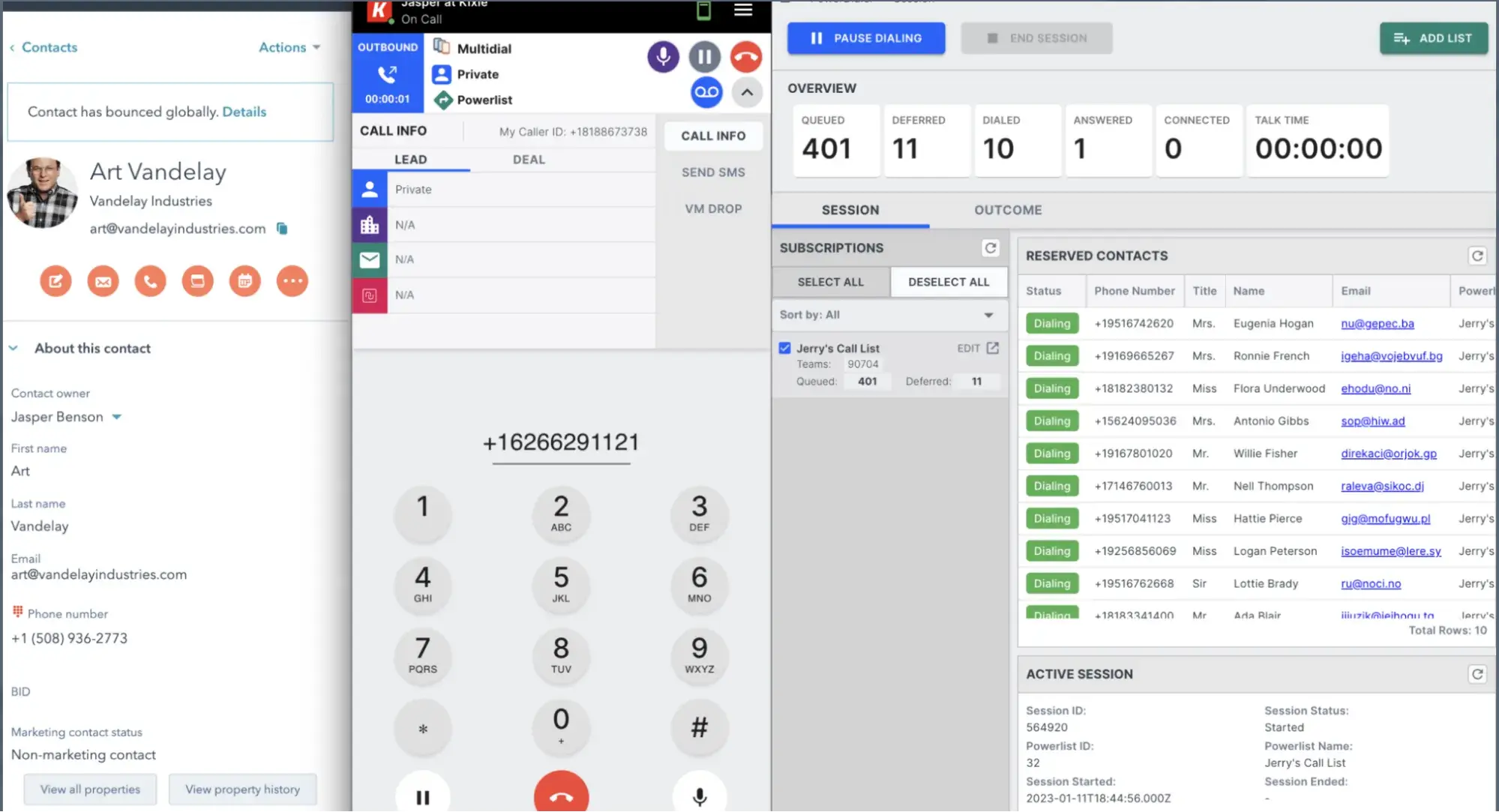
Best for: Reliable, easy-to-integrate calling and texting automation
Kixie is one of the preeminent prospect outreach resources on the market. It’s a customizable business calling and texting platform that allows you to thoughtfully and effectively time and target your sales calls, letting you connect with the right prospects at the right time.
The software folds easily and seamlessly into your tech stack, and it can integrate with several high-profile platforms, including HubSpot, Slack, and Pipedrive.
It’s also one of the most accessible options in its space. In fact, I’ve found that virtually any user can quickly pick up and leverage the program without extensive training. So, if you’re looking for a streamlined, low-maintenance solution that lets you connect with your prospects exactly when they’re most likely to be receptive to your outreach, look into Kixie.
Key Features and Benefits
- Supports an extensive suite of integrations
- Enables you to contact thousands of prospects in a single day
- Easy implementation with minimal training required
4. HubSpot Sales Lead Management & Prospecting Software
Pricing: Free plans are available
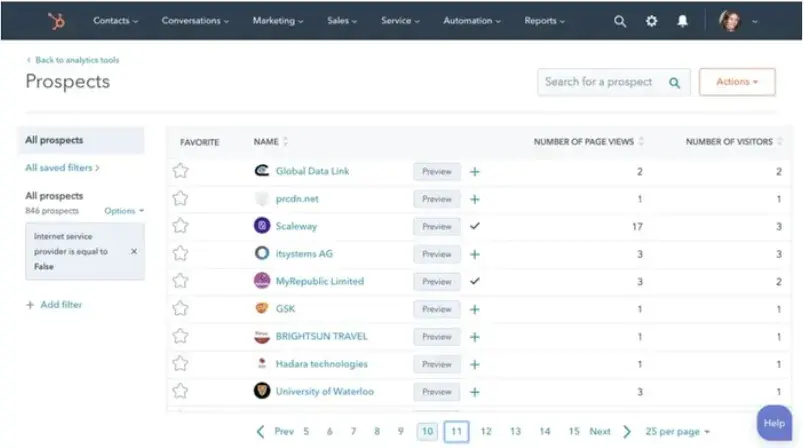
Best for: Establishing a baseline for a sound prospecting infrastructure
HubSpot’s Sales Lead Management and Prospecting Software is a collection of resources that helps you refine and more effectively conduct your engagements with leads and prospects — and it covers a lot of bases.
This solution includes a conversation intelligence system that can give you perspective on how to best tailor your messaging, as well as automated email sequencing, customizable email templates, predictive lead scoring, and several other first-rate resources for better understanding and catering to your prospects.
HubSpot’s Sales Lead Management and Prospecting Software is essentially a one-stop shop that offers a foundation for effective prospecting.
If you’re looking for a suite of free resources that provide virtually everything you need to set your sales org up with a solid prospecting infrastructure, I definitely recommend checking out these resources.
Key Features and Benefits
- A range of resources, including conversation intelligence, email templates, email sequences, predictive lead scoring, and reporting
- Ability to track and filter leads to identify viable prospects
- Seamlessly blends with your tech stack
5. SalesHandy
Pricing: Plans start at $7 per month per slot
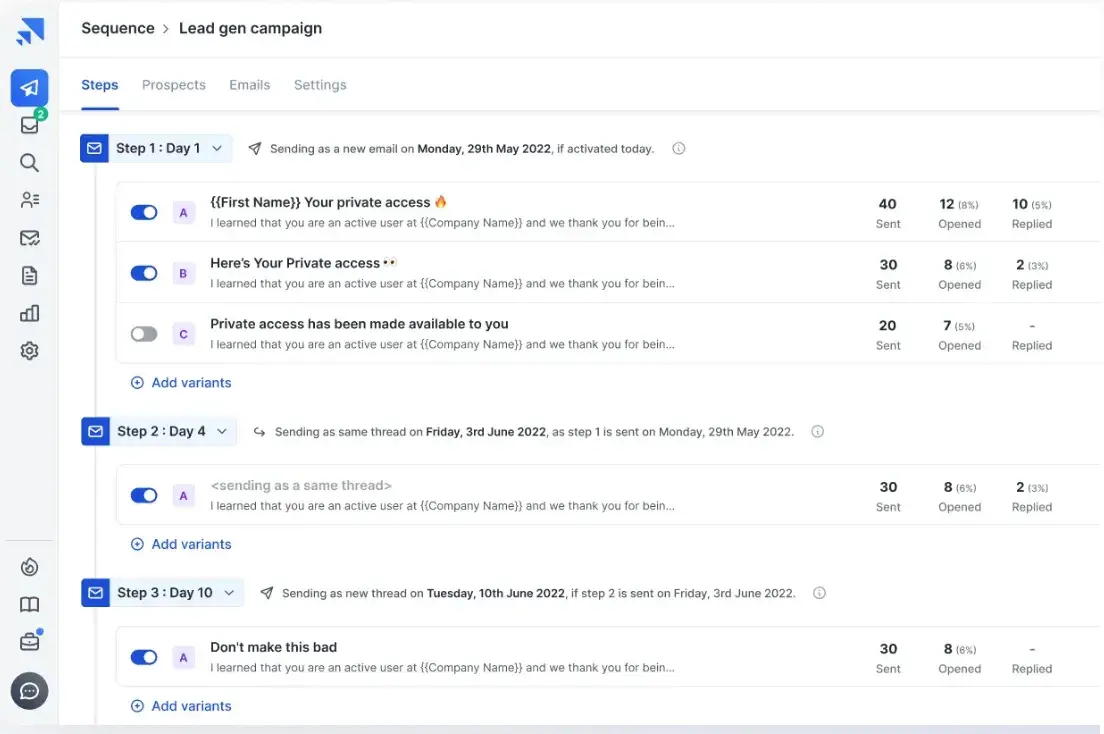
Best for: Sound, approachable cold email outreach
SalesHandy is an outreach resource that allows you to reliably send thoughtful, effective, high-converting cold emails. The solution offers features like automated, multi-stage sequences for consistent follow-up — ensuring interested prospects don’t fall through the cracks.
The software lets you standardize your outreach strategy without sacrificing personalization, helping you tailor your subject lines and email copy to suit individual prospects (without too much legwork).
It also ensures that the content of your emails isn’t too robotic, letting you circumvent spam filters and deliver emails your prospects will actually read.
Ultimately, SalesHandy is a cold email solution with a robust suite of features that can help you reach out to prospects more effectively. If you’re looking to integrate a platform that can enhance how you connect with prospects into your tech stack, consider looking into SalesHandy.
Key Features and Benefits
- Automated follow-up for scheduling multi-stage email sequences
- Merge tags that allow for personalization
- Easy integration with your current email provider
6. UserGems
Pricing: Plans start at $10k, pricing is usage-based
 Best for: Capturing buying signals and automating the next steps with AI assistance.
Best for: Capturing buying signals and automating the next steps with AI assistance.
Buying intent data helps reps understand and prioritize high-intent leads, cutting through the noise and focusing sales and marketing efforts on prospects who are actually ready to make a purchase.
UserGems helps revenue teams monitor their ICP accounts for buying signals to identify buyers most likely to convert. Then, it tells your reps who to contact, when, and why. Using those signals, it drafts emails, cold call scripts, and LinkedIn messages for your reps to review (or it sends them automatically for them).
By streamlining prospecting and workflows, reps can spend 90% of their time prospecting and selling instead of manual research and data entry. With UserGems, you’ll 10x your team’s performance and efficiency.
Key Features and Benefits
7. Crunchbase
Pricing: Plans start at $29 per user per month
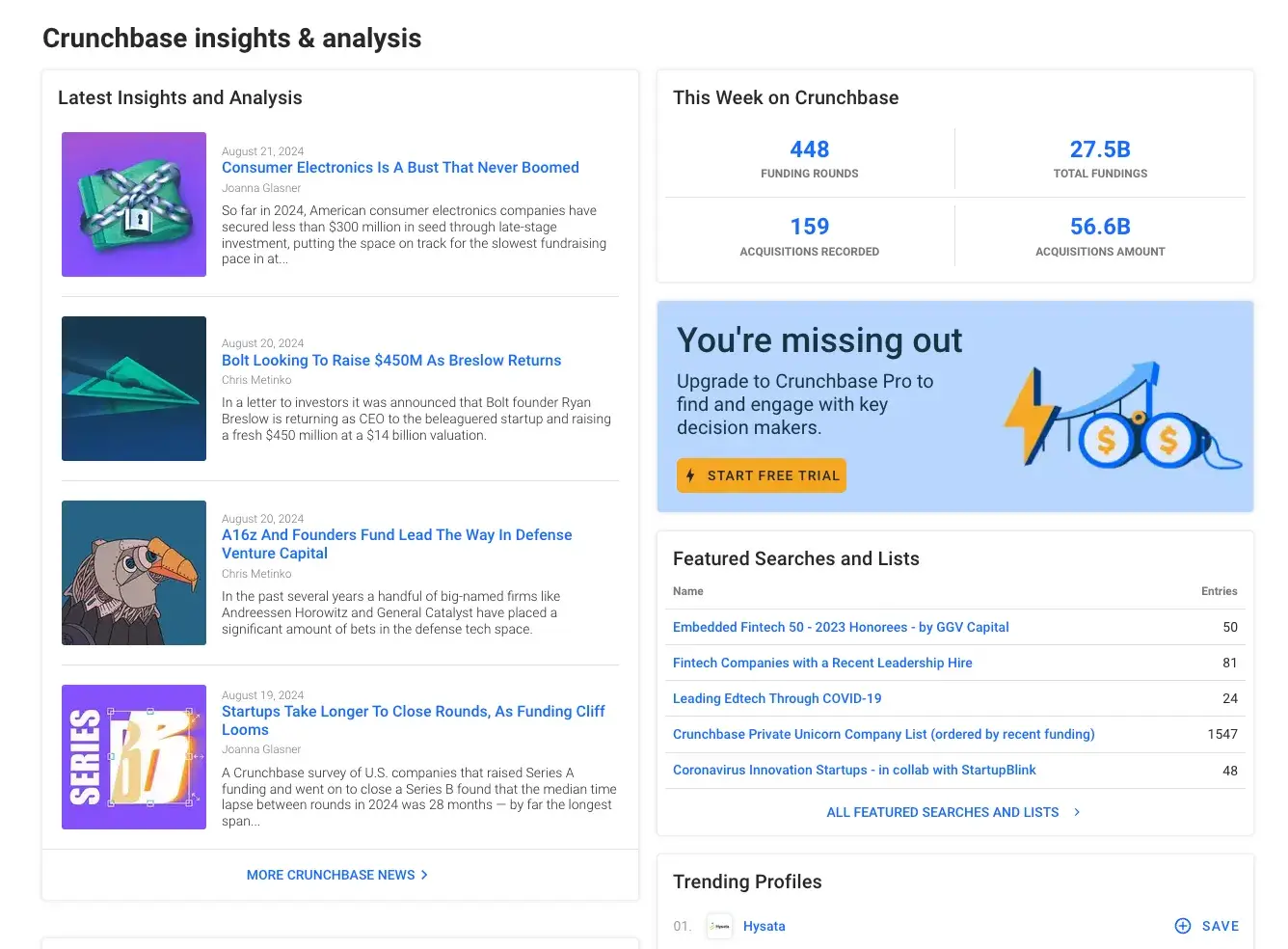
Best for: Screening and discovering businesses that fit your ideal customer profile
Crunchbase is essentially a business intelligence gathering platform that lets you pull live company data to inform more targeted, effective prospecting. It lets you search for and pull information from a massive database of organizations, providing insight into individual companies’ characteristics and operations.
The platform gives users a picture of key elements of how a business functions and performs, including investment information, founding members, leadership profiles, mergers, acquisitions, news, and industry trends.
In this way, Crunchbase effectively centralizes and streamlines your prospect research efforts, providing you with valuable intel that can help you structure more thoughtful pitches and execute better-targeted outreach.
So if you’re looking for a solution that can both simplify and enhance how you understand your prospects, Crunchbase is definitely a strong option to consider.
Key Features and Benefits
- An extensive pool of live data on thousands of potential prospects
- A filtering function that lets you pare down your searches based on ideal characteristics
- Live tracking to keep tabs on key company events and developments
8. Wiza
Pricing: Free plan is available with paid plans starting at $25 per month
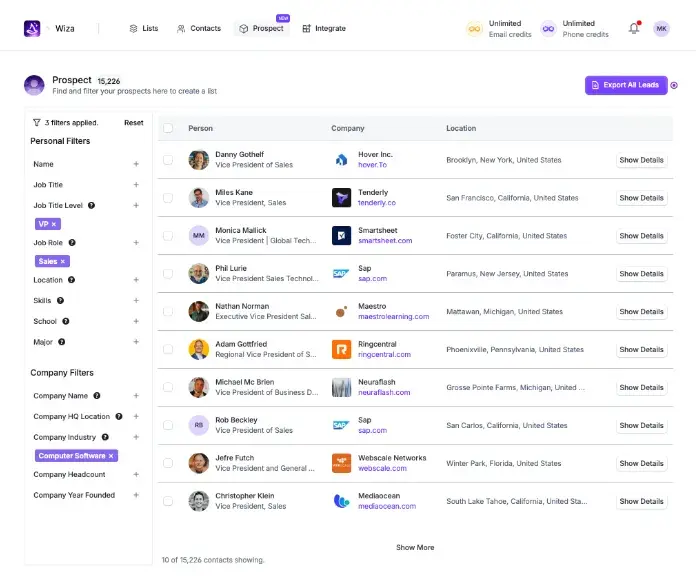
Best for: Finding real-time verified email addresses
Wiza is a popular sales prospecting platform for sales, marketing, and recruiters. It is one of the only prospecting platforms that provides real-time email verification within the app, to ensure high levels of email accuracy and deliverability in your prospecting outreach. With Wiza, you can build and save email lists, then export them as CSV or sync them to CRMs including HubSpot.
In addition to their prospecting platform, Wiza offers a free Chrome extension that allows you to view email and contact information while browsing LinkedIn profiles. This extension can also be used to export large lists with email addresses and phone numbers from filtered and saved searches in LinkedIn Sales Navigator and LinkedIn Recruiter.
Key Features and Benefits
- Search and discover real-time verified email addresses and contact info
- Bulk export or integrate directly with popular tools like HubSpot, Outreach, and more
- Free Chrome extension that provides emails while using LinkedIn, LinkedIn Sales Navigator, and LinkedIn Recruiter
9. SalesIntel
Pricing: Contact for custom pricing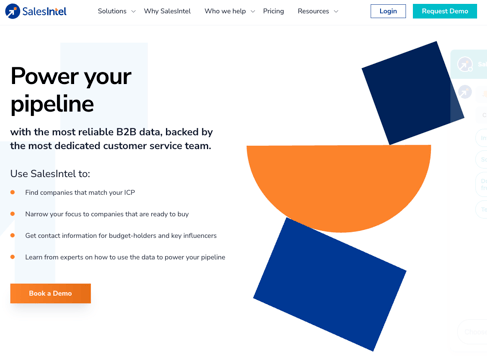
Best for: Accessing human-verified B2B contact data and intent-driven insights
Finding leads is one thing, but getting accurate, up-to-date contact details is another challenge entirely. Outdated emails, disconnected phone numbers, and missing decision-maker info can stall even the best sales strategies. That’s where SalesIntel stands out.
SalesIntel ensures your prospecting efforts are fueled by 95% accurate, human-verified B2B data. Whether you need direct dials, mobile numbers, or intent signals, SalesIntel gives you a complete picture of your ideal prospects. So you’re always reaching out at the right time, with the right message. From technographic and firmographic insights to VisitorIntel, which identifies anonymous website visitors, SalesIntel provides the tools to turn raw data into real opportunities.
Key Features and Benefits
- Human-Verified Contact Data: Every email and phone number is manually verified to ensure accuracy.
- Intent Data & Intent Automation: Identify prospects actively searching for solutions like yours.
- Mobile & Direct Dials: Reach decision-makers directly without navigating gatekeepers.
- RevDriver Chrome Extension: Pull verified contact details from LinkedIn and company websites instantly.
- VisitorIntel & AdsIntel: Uncover site visitors and run targeted ad campaigns to stay top-of-mind.
10. Gong
Pricing: Contact for pricing
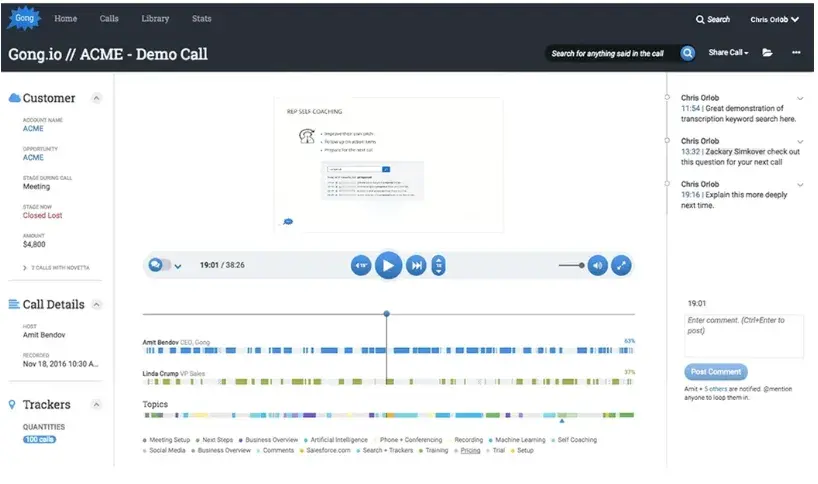
Best for: Improving outreach efforts via coaching reps
Gong might be the most prominent conversation intelligence platform on the market. It’s a powerful solution that boasts an impressive list of customers, including LinkedIn, Zillow, and Okta — and for good reason. The platform is dynamic, intuitive, and can enhance virtually every aspect of your sales process.
This solution offers a range of sales-call-related features, but its support for more targeted call coaching is especially powerful for improving sales organizations’ prospecting efforts.
Gong gives sales managers access to recordings, transcripts, and other data to help them zero in on where reps are struggling when conducting outreach. All of that information can also expose other flaws and inefficiencies in elements of a sales org's prospecting efforts, such as its call cadence or sales messaging.
All told, Gong is one of the most effective, accessible resources a sales org can leverage to ensure its phone outreach is first-rate and help reps prospect more thoughtfully.
Key Features and Benefits
- Guided workflows to help you establish repeatable processes for better-targeted call coaching
- Visible transcripts for focused call analysis
- An impressive suite of integrations — including HubSpot, Salesforce, and Slack
11. SoPro
Pricing: Paid Plans start at £3,000/month
Best for: Businesses that don’t have the resources to run prospecting themselves
Sopro’s fully managed prospecting service is for B2B sales teams that don’t have the time or resources to run outreach themselves. They combine expert strategy, live data sourcing, and multi-channel engagement.
Rather than tying up sales reps with prospecting admin, Sopro takes care of the entire process. A dedicated team tailors, delivers, and refines campaigns so sales reps can stay focused on selling. Sopro has a client portal for live reporting and is fully integrated with HubSpot.
Key Features and Benefits
- Dedicated outreach experts managing your entire campaign
- Access to the tech, tools, and data of a leading B2B agency
- Multi-channel campaigns and transparent performance tracking
13. VerifiedEmail
Pricing: Free trial, paid plans available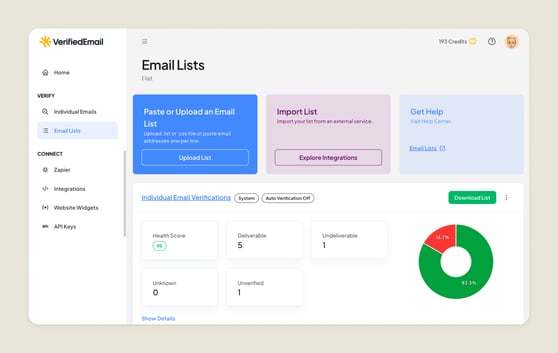
Best for: Real-time email list verification and cleaning
VerifiedEmail helps sales teams avoid wasting time and money on invalid leads by checking email addresses in real-time with 99% accuracy—so your campaigns hit real, active inboxes. Its proprietary technology quickly identifies invalid or disposable emails, spots role-based addresses (like info@, sales@) for targeted outreach, and removes duplicates—improving deliverability and reducing bounce rates.
You can use its user-friendly widget directly on your website to validate emails as users sign up, or integrate it into your existing sales workflow through its API—connecting with HubSpot, Zapier, Klaviyo, and more.
Key Features and Benefits
- Verifies and cleans email lists with 99% accuracy
- Identifies role-based emails for improved prospect targeting
- Provides real-time verification at lead capture (widget)
- Simple API integration with HubSpot, Zapier, Klaviyo, and others
13. Lusha
Pricing: Free plans available
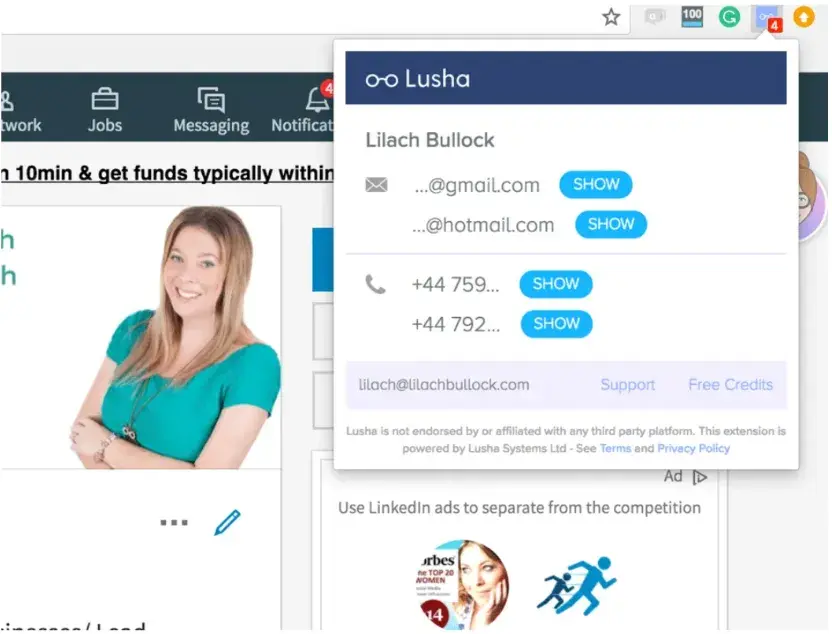
Best for: Easily sourcing and accessing prospects' contact information
Lusha is a first-rate data enrichment resource for finding prospects’ contact information, including both email addresses and phone numbers. This solution allows you to easily and reliably connect with decision-makers and other key contacts at a range of businesses.
The program’s “contact search” feature provides as many as 1,000 contacts — supported by enriched data — in a single search. It also lets you pull up millions of potential prospects’ direct dials.
From there, the software lets you convert those searches into focused, clean, exportable contact lists. Plus, all of these features come in a straightforward yet powerful interface that’s easy for anyone to use.
Key Features and Benefits
- Robust “contact search” function
- Similarly thorough “company search” function
- Extensive suite of integrations, including HubSpot, Salesforce, and Gmail
14. Datanyze
Pricing: Free plans are available
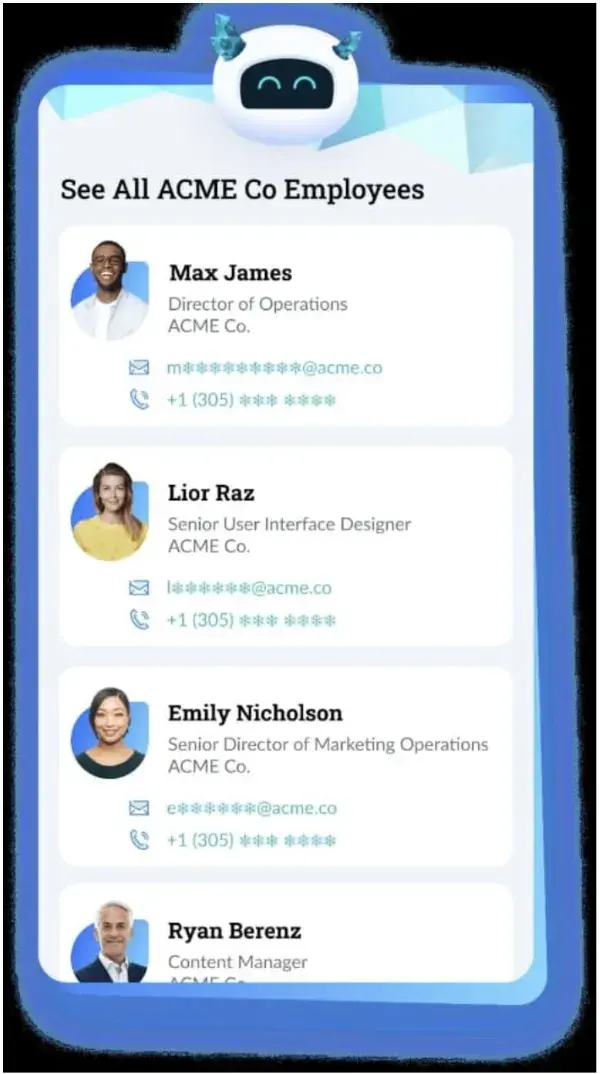
Best for: Conversationally connecting with prospects
Datanyze is an intuitive Google Chrome extension that allows salespeople to easily access B2B contact information and other valuable prospect data, including email addresses, direct dial numbers, and company details.
In addition, Datanyze really sets itself apart with its personalization. The program leverages automated machine learning to support one of the most detailed B2B databases on the internet — and that degree of detail doesn’t go to waste.
Datanyze then uses that insight to structure relevant icebreakers for individual prospects: unique conversation starters informed by data from sources like prospects’ social media feeds and local news publications.
Key Features and Benefits
- A robust, detailed B2B contact library
- Easily integratable (so long as you have Google Chrome)
- Generates specific, effective icebreakers for prospect outreach
15. Ring.io
Pricing: Ring.io costs $89 per user per month for HubSpot integration
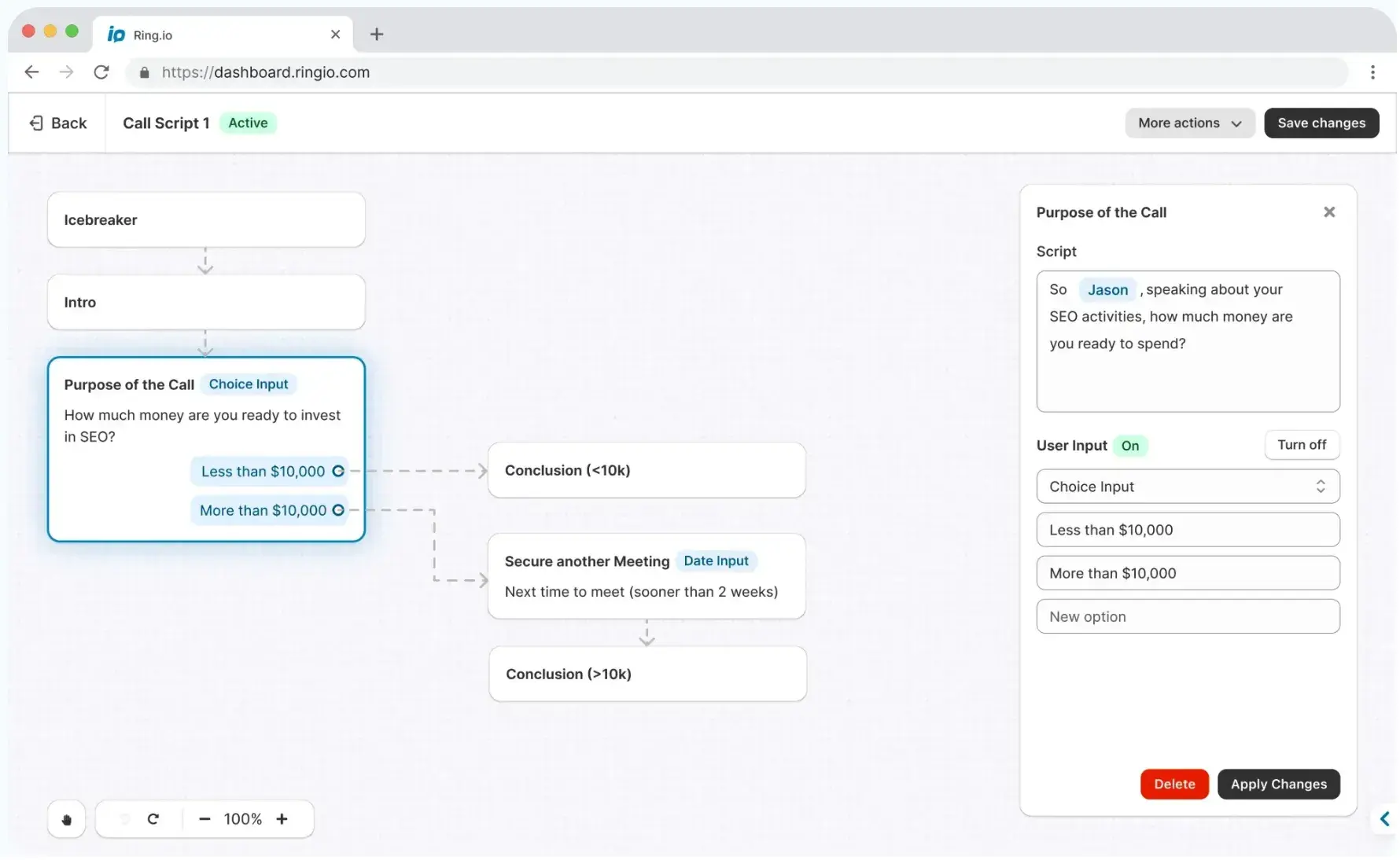
Best for: Improving sales call productivity
Ring.io is a sales dialing solution that streamlines your team’s sales call process and improves your org’s sales call volume (without sacrificing productivity). It allows your reps to dial directly out of your CRM, easily and reliably connecting them with the right prospects.
The program also includes features like automated local caller ID and automatic pre-recorded voicemails — making your prospect outreach more efficient, personalized, and approachable.
Leveraging Ring.io also lets you shape and refine an effective call cadence, and the software accommodates even the longest of leads lists. Taken together, Ring.io’s many features can help you achieve wider-reaching, more productive sales calls.
Key Features and Benefits
- Direct dialing out of your CRM
- Automated local caller ID to improve connect rates
- Automated pre-recorded voicemails for prospects you miss
Featured Resource: Prospecting and Objection Handling
Now, let’s take a step back and look at the sales prospecting process as a whole.
Sales Prospecting Process
Alright — so, you've decided who you want to pursue. Now, it’s time to get even more granular and jumpstart the nurturing process, ideally resulting in a closed-won deal. Regardless of what your sales pipeline looks like, you’ll typically go through the following phases.
1. Research
Effective prospecting begins by further researching the prospects you’ve determined are generally a good fit. The goal during this phase is to determine the quality of the prospect: that is, how likely they are to make a purchase, based on factors like their budget and challenges.
And how do you figure that out? You evaluate the prospect using preset qualifying dimensions — a set of criteria to evaluate the probability that a lead or prospect will become a customer — and keep track of your findings through a CRM.
2. Outreach
Once you’ve qualified the prospect, you’ll need to reach out to someone at the business using a sales prospecting email.
In many cases, you’ll have to deal with a gatekeeper. Whether they’re a personal assistant, a receptionist, or some other company representative, this is the person who essentially screens you before you can connect with someone who has decision-making authority.
Then, once you work your way past the gatekeeper (or multiple gatekeepers), you’ll ideally be put in touch with a decision-maker: Typically someone in the C-Suite or at the director level. This is the person who has the seniority and authority to purchase products or services like yours.
3. Discovery Call
After connecting with a gatekeeper, you’re going to want to schedule a discovery call. A discovery call is a preliminary conversation with a prospect in which you ask thoughtful, relevant questions to uncover their goals, interests, and pain points.
This call is a unique opportunity for you to simultaneously understand and impress your prospect. Asking the right questions can help you tease out the information needed to understand whether your offering suits their business — and to understand what an effective value proposition would be for them.
But an effective discovery call is more than a conversation for gathering intel. It’s also a chance for you to demonstrate your relevant knowledge and start building rapport with the prospect.
By asking thoughtful, articulate questions that speak to how well you understand elements like their industry or scale, you can establish yourself as a trustworthy authority in their space right off the bat. And by having a conversational, disarming conversation (without sacrificing professionalism, of course), you can plant the seeds of a productive working relationship.
4. Educate and Evaluate
After your discovery call, you can use the insight you gathered to evaluate and qualify the prospect’s needs. This stage is where you determine whether a prospect legitimately needs your solution, how viable a potential deal is, and how to frame your value proposition — making it one of the most (if not the most) crucial steps in the sales prospecting process.
Here, I’d suggest considering two main factors: pain points and potential objections.
Pain Points
A company’s pain points are the issues, concerns, or gaps in its operations that your product or service could remedy. With the information from your discovery call, you should be able to piece together what those aspects look like for your prospect.
For instance, let’s say you work for an ed-tech company that offers curriculum scheduling software, and you’ve just had a discovery call with a midsize community college.
During your call, you learned that it takes students at the school an average of three years to earn an associate’s degree, leading to lower enrollment than at competing schools, where students earn their degrees in just two years.
You also found that classroom scheduling conflicts — stemming from the institution’s existing curriculum scheduling system — are causing required courses for popular majors to fall by the wayside every semester.
Piecing those two bits of information together, you could both identify course scheduling as a major pain point and point to how your software could fix the problem, giving you the basis for an effective, concrete value proposition.
Still, you must be confident your company’s ed-tech solution can flawlessly fix all the challenges specific customers may deal with. That means you have to be able to handle any potential future hiccups throughout your relationship before they go out of hand.
In these scenarios, root cause analyses (RCAs) are useful for quickly pinpointing what errors caused specific issues to pop up, why, and how to fix them in time. To make the process even easier, you can use our free RCA template so you can get to work right away.
Objections
You also need to be mindful of potential objections your prospect might raise, such as budget or time constraints. When preparing for this part of the process, make sure you thoroughly understand both the specific pain points you identified and the state of the business in general.
Have a pulse on the company’s current buying power as well as whether it really needs a solution like yours, exactly how urgent that need might be, and the soundness of the rapport you’ve established with your prospect up to this point. With all of that in mind, try to think about potential areas of pushback that might emerge.
It’s also vital to know your prospect’s business inside and out, so that when they raise objections, you can be specific in how you respond. That means explaining how your solution will address their unique issues, rather than just touting your product or service’s features in general.
5. Close
At this point, you should have all the information you need. You know the prospect’s challenges, pain points, and possible objections. Now, it’s time to try to turn them into a customer. This will result in one of two outcomes:
- Closed-won: When the buyer purchases a product or service from the sales rep.
- Closed-lost: When the buyer fails to purchase a product or service from the sales rep.
Tracking these two metrics enables you to calculate your closing ratio, or the ratio of prospects that you close and win.
The process described above offers a general approach to prospecting. But as you move through it, there’s another key choice you’ll have to make: Will you engage with prospects through outbound or inbound prospecting (or a bit of both)?
Below, I’ll share each of these options, and offer tips and tricks to help you choose the best approach for your business.
Outbound vs. Inbound Prospecting
The field of sales is constantly evolving. As such, how prospecting is conducted is naturally shifting with it. Sales reps no longer have to choose between inbound or outbound prospecting — now, they have the flexibility to incorporate elements of both into their efforts.
Outbound prospecting is when you reach out to leads who haven’t yet expressed an interest in your product or business. You typically identify prospects through independent research, whether by finding them on LinkedIn, Googling them, or using another platform.
Inbound prospecting is when you reach out to a lead who has already shown an active interest in your business or product. Perhaps they’ve visited your website, subscribed to your blog, or maybe even submitted a form asking to speak to a sales rep. You then engage with them to understand whether they’d be a good fit for your product.
Here are the key differences between the two methodologies:
|
Outbound prospecting |
Inbound prospecting |
|
|
Outreach |
Cold calling or emailing — unsolicited calls to sell your product or service |
Warm emails to explore a relationship with a lead who has already expressed familiarity with your product or service |
|
Social “spamming” |
Unsolicited social media messages to sell your product or service |
Use social media to explore a relationship with a lead who has already expressed familiarity with your product or service; you can provide value to prospects on social media by answering their questions and introducing them to useful content |
|
Process |
Research takes longer without any prior history with a contact, meaning you have less context when you’re ready to reach out to establish a connection |
Research process is shorter as you already have their contact information and interaction history, providing you with context about the prospect’s interests or prior behavior and allowing you to develop more personalized outreach |
|
Example |
“Hi John, I wanted to reach out to you because I’ve worked with companies similar to yours in the past.” |
“Hi John, I’m reaching out because I noticed you were looking at our e-book on improving sales productivity.” |
My recommendation? Lean mostly on the inbound methodology when you prospect — but still include a responsible approach to outbound tactics like cold calling and cold emailing. Especially for businesses that don’t have enough qualified inbound leads, outbound can be an important component of the process.
But regardless of whether you’re focused on outbound or inbound, it’s critical to make sure you’re helping the buyer (rather than selling to them), leveraging their context and understanding who they are and what they need.
Of course, that’s easier said than done. How do you find prospective buyers and learn the context surrounding their business needs? Even more importantly, how do you determine whether or not you should begin the process of selling to them?
There’s no one-and-done answer, but asking the sales prospecting questions below can help you qualify prospects and focus on your highest-potential leads:
Sales Prospecting Questions
Knowing who to pursue saves us a significant amount of time. Not every lead is fit to be a prospect, and not every prospect will become a paying customer. Luckily, there are a few questions you can ask to help you determine whether a prospect is worth pursuing.
This isn’t just relevant for inbound leads. Even if you use outbound prospecting methods, asking these questions should help you see a much better response rate, because you took the time to vet their business for suitability.
Below, I’ve put together some of my favorite qualifying questions, as well as related takeaways, to help you evaluate whether or not a prospect has a high probability of becoming a customer.
Is the prospect’s business an organizational fit?
This type of qualification is based solely on demographics. Does the prospect fall within your territory? Do you sell in their industry? Do they fit your buyer persona?
Say your target market consists of small- to medium-sized businesses with anywhere from 100 to 1,000 employees. You should eliminate any potential customers outside of these criteria.
Diving deeper, your product or service will naturally provide higher value to a particular profile within that target market, such as larger teams with medium-sized businesses. Those customers are also more likely to upgrade to a higher tier of your product, providing more lifetime value as a customer.
Takeaway: Prioritize customers based on the size of the opportunity or their potential lifetime value.
Have you identified key stakeholders?
There are two types of people involved in the other end of your sales process: decision-makers and influencers.
Influencers may not have the power to buy, but they’re often the ones who will be using the product, and thus, they can become your biggest internal advocates. If you get them to rally around your offering, they can make a compelling case to decision-makers before you even speak with them.
Decision-makers are, of course, the ones that either approve or reject the buy. You can ask the following questions to determine the decision-making process: Will anyone else be involved in this decision? Does this purchase come out of your immediate budget?
Takeaway: Keep a working list of influencers and buyers, perhaps mapped out by the organizational structure of the organization. You’ll use this list later in the outreach phase.
Are the prospect’s constraints a deal-breaker?
Time constraints and budget limitations are often the biggest objections you’ll receive from prospects.
Before wasting time on an exploratory call to hear these objections, do some homework to see if you can filter out potential buyers who clearly don’t have the money or bandwidth to consider your offering.
For example, if you see that a prospect has just launched a new marketing campaign, they might not have the time to cycle through an extensive sales process.
Takeaway: Take note of prospects who don’t currently have the bandwidth to talk to you but might later be a good fit, and revisit them at a later date.
Are you familiar with the prospect’s market?
You’re likely to be more familiar with certain types of companies, markets, or industries than others. Your pitch and sales techniques are also likely to be more refined with markets you feel comfortable talking about, so you should prioritize these prospects first.
Takeaway: Group similar prospects by characteristics such as their service offering, their market, or their industry, and then prioritize these groups based on your familiarity with them.
Would your company add substantial value?
Prospects to whom you can provide more value are more likely to buy your offering. For example, if you’re selling basic digital marketing services and you see that your prospect already has a robust web presence, the probability you can add tremendous additional value is low.
Takeaway: Classify prospects by the level of value you think you can provide, and prioritize those for whom you would offer the highest value-add.
Do they have an awareness of your offering?
Your prospects will likely have varying levels of knowledge about your product or services. The more awareness they have, the more likely they are to see the value in your offering and become customers.
If a prospect has visited your website, subscribed to your blog, or posted content about something related to your offering, they probably know a lot about your company or service — and so they’ll probably be more likely to buy.
Takeaway: Group prospects by their level of awareness, and prioritize those who have demonstrated more awareness of your company.
Prospecting Email Examples
Once you've identified your prospects, it’s time to start connecting with them. Ready to reach out to some prospects? Use the following email templates to get started:
1. Reaching Out After a Referral
Subject: [Name of referrer] recommended we connect
Hey [prospect name],
It’s great to meet you. Our mutual connection, [name of referrer], recommended I get in contact with you because [X].
I would love to hear more about what you do in your role — according to [name of referrer], it seems like you may be facing [X] challenges.
[Product name] can help you achieve [X] and increase efficiency by [X]%.
Is that a priority for your team right now?
Best,
[Your name]
2. Providing Links After They Downloaded a Resource
Subject: More [specialty] resources for [business name]
Hi [prospect name],
It’s great to meet you. How are you enjoying [name of resource] so far?
I can see that you’re interested in [X] and so I compiled three more resources that will help your team do [X] better.
- [Link 1]
- [Link 2]
- [Link 3]
In the meantime, I’d love to hop on a phone call and learn about how your quarter is going so far. Are you available on Thursday morning for a 10-minute call?
Best,
[Your name]
3. Congratulating Them for an Award or Publication
Subject: Congrats on [award]
Hi [prospect name],
Congratulations on receiving [award]! That’s a rare accomplishment — kudos to you and the team.
To introduce myself, I’m a [title] at [company]. I work with small businesses in your industry to achieve [X] results. Just last week, [competitor] told me they finally reached their goal of [X], boosting their ROI to [X]%.
I’d love to chat and see whether we can get similar, if not better, results for you. Would you be available for a ten-minute call on Friday?
Best,
[Your name]
Prospect Marketing
Prospect marketing is a brand of content marketing a business leverages deeper in its sales process than most other types of marketing. It involves providing a prospect with media like sales collateral, technical documents, and other resources to help influence their decision-making as they move closer to closing.
So, you’ve successfully prospected a handful of potential clients. Now what? It’s time to nurture those prospects with prospect marketing.
Prospect marketing is essentially bringing a prospect closer to, well, closing. Just because you’ve connected with a prospect doesn’t mean you should stop all your marketing efforts. Instead, your marketing should become more personalized and targeted.
If you haven’t already developed sales collateral, work with your marketing and customer service teams to prepare these materials for potential buyers in each stage of their journey. Email templates, call scripts, and pre-call checklists are just a few of the tools I’d suggest to help you streamline the prospect marketing process.
Another prospect marketing strategy is creating workflows in tools like HubSpot. Workflows automate your marketing processes — including how you market to your prospects.
Use workflows to set up pre-written emails, SMS messages, or in-app notifications that are sent to your prospects based on certain triggers, such as a video view, a content offer download, or inactivity for a certain number of days.
In short, anything that keeps your prospects engaged with and educated about your brand is considered prospect marketing. Even a daily or weekly check-in with prospects counts. Again — just because you’ve connected with a prospect doesn't mean the marketing should stop.
Begin Sales Prospecting
Prospecting doesn’t have to be a difficult or tedious process. In fact, it can be a positive experience for both sales reps and prospects. So don’t be afraid to incorporate a few of the strategies I’ve reviewed above into your workflow, and to experiment with different techniques and tools to see what works best for your team. You’ll be sure to start converting more good-fit prospects into paying customers in no time at all!
Editor's note: This post was originally published in May 2018 and has been updated for comprehensiveness.

Free Sales Objection Handling Guide
An easy-to-use guide full of templates, best practices, and strategies for salespeople and managers looking to close deals.
- Data-backed behaviors top sellers use to combat pushback
- How to write effective meeting invitations
- A three-step objection handling framework
- And More!
Download Free
All fields are required.

Sales Prospecting



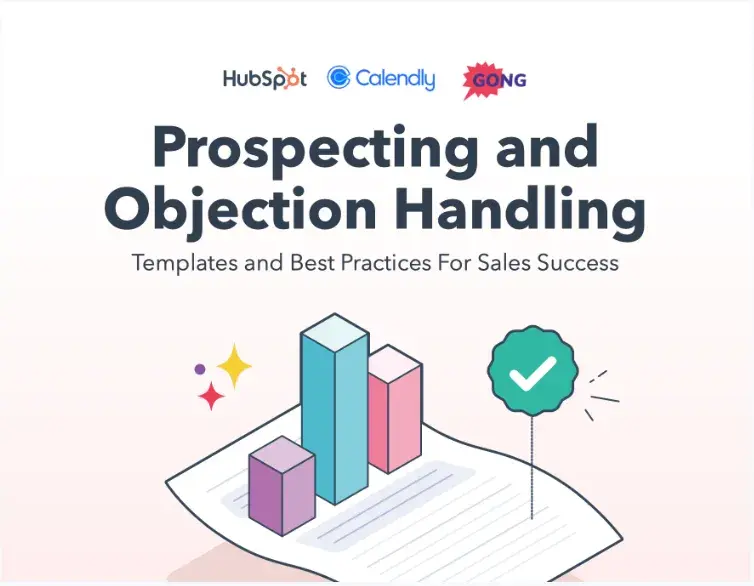





![How to Find Almost Anyone’s Email Address, Without Being Creepy [+Expert Tips]](https://www.hubspot.com/hubfs/132_Find%20Email%20Address.jpg)



